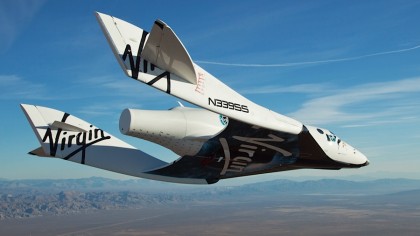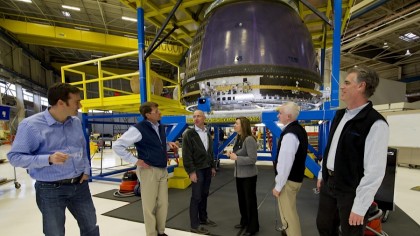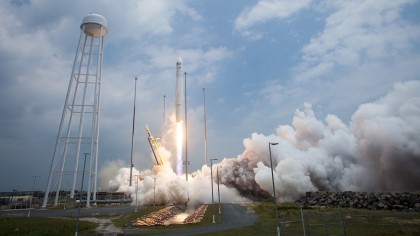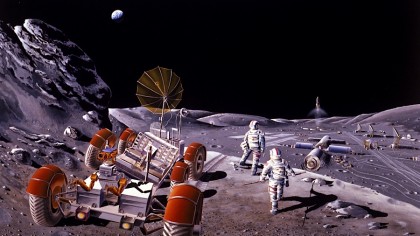The new space race: who's who in the realm of space exploration
SpaceX isn't the only company trying to get us to space
Sir Richard's star tours
Naturally, one of the more ambitious plans for commercial space travel involve tourism - as in, sending average folks like you and me for a ride we're not soon likely to forget, 62 miles over the heads of our friends and loved ones.
Spearheading this effort is Virgin Group billionaire Sir Richard Branson, whose Virgin Galactic program plans to blast six people into orbit for a cool $250,000 per head. The flight will include five minutes of weightlessness prior to reentering Earth's atmosphere and land as gracefully as a traditional airplane.

Virgin Galactic claims only 574 humans have traveled into space to date, so its mission is democratize such travel for everyone on the planet, or at least, those wealthy enough to book a ticket. (So far, more than 600 people have booked a ticket on a Virgin Galactic flight, though only test pilots have flown so far.)
Branson's ambitious plans to kick off commercial spaceflights in 2015 took a deadly turn last October when a failed SpaceShipTwo test flight which took the life of pilot Michael Alsbury, an employee of another private spacecraft pioneer, Scaled Composites.
Amazon goes up, up and away
Amazon founder Jeff Bezos has invested a big chunk of his wealth into Blue Origin, the company responsible for one of the more unique spacecraft to date. New Shepard (named after first US astronaut Alan Shepard) has been designed to take off and land vertically, transporting astronauts in a rocket pod with nine engines.
Blue Origin first found success with Goddard, a test vehicle named after rocket pioneer Robert Goddard and modeled after NASA's DC-X; the company continues to invest in the same cone-shaped design with four legs.

With additional funding from NASA, the relatively low-key Blue Origin has been toiling away quietly in the background for the last 15 years, living up to its motto "gradatim ferociter" (which loosely translates to "step by step, ferociously").
Get daily insight, inspiration and deals in your inbox
Sign up for breaking news, reviews, opinion, top tech deals, and more.
The commercially-minded Bezos hopes to use New Shepard to send three people into space each week "at dramatically lower cost and increased reliability," goals made possible thanks to the reusable nature of the company's launch vehicles.
SpaceX-ploration
One of the most visible faces in the modern space age is Space Exploration Technologies Corporation. Better known as SpaceX and founded by Tesla mogul Elon Musk, the company is notable as the first to launch a privately-owned ship into orbit and have it return safely to earth.
Flush with a NASA contract to haul cargo to the ISS, the SpaceX Dragon has already had three successful launches from Cape Canaveral this year in as many months, powered by the company's Falcon 9 rocket.
However, SpaceX faced a setback on April 14 when it performed a test to see whether one of the rockets could land on a floating barge perched in the Atlantic Ocean; it accomplished that mission, but wound up falling sideways and exploding on impact.
SpaceX already has another 13 launches scheduled through 2015, and plans to eventually transition its Dragon cargo container into a manned spacecraft capable of sending up to seven people to the stars.
The big hitter you probably haven't heard of
While SpaceX may be better-known to a generation of social network users for its frequent social media posts, Orbital ATK, Inc. has become the closest thing we've got to a privatized version of NASA.
Based in Virginia and formerly known as Orbital Sciences prior to a merger with Alliant Techsystems, the company has dabbled in everything from orbiting satellites and deep space probes to high-altitude payload deliveries and yes, holds a lucrative NASA contract worth $1.9 billion for flying cargo missions to the International Space Station.

Orbital has had more successes than failures to date, but lost some momentum last fall when its fifth launch of the Cygnus spacecraft using a refurbished, Russian-built Antares rocket ended with the destruction of the vehicle and damage to the launch pad. (Orbital abandoned the older AJ-26 engines that led to the accident.)
Founded in 1982 by a trio of Harvard Business School graduates, the company first made headlines in 1990 with the launch of the Pegasus rocket. No stranger to setbacks, Orbital is well-positioned to become the heaviest of hitters among commercial space organizations who design and manufacture small- to medium-class rocket systems.
Into the final frontier
There's plenty more to look forward to with commercial space flight in 2015 and beyond. In addition to 13 more SpaceX launches planned for this year, XCOR Aerospace intends to fly its Lynx spacecraft with a pilot, single passenger and science payloads in tow throughout the year, reaching altitudes of 330,000 feet (100 kilometers).

Orbital ATK has also announced plans to launch its Cygnus CRS Orb-4 on November 20, a flight postponed from April 1 in the wake of the Antares rocket failure in October 2014. There are also more lofty future plans in the works from the likes of Mars One, which eventually hopes to host a human settlement on the red planet.
Many of the companies pioneering commercial spaceflight maintain an active presence on social media, so it's easy to keep tabs on future launch plans. SpaceX offers the most comprehensive information with accounts on Twitter, Facebook and YouTube, while Virgin Galactic offers Facebook and Twitter, and Blue Origin maintains only a Twitter presence, as do both NASA and Boeing Defense.
One thing's for certain: The future of private space travel is still in its infancy, which means we've got a long way to go before anyone stakes a real claim to James T. Kirk's final frontier, let alone reaches it at all.